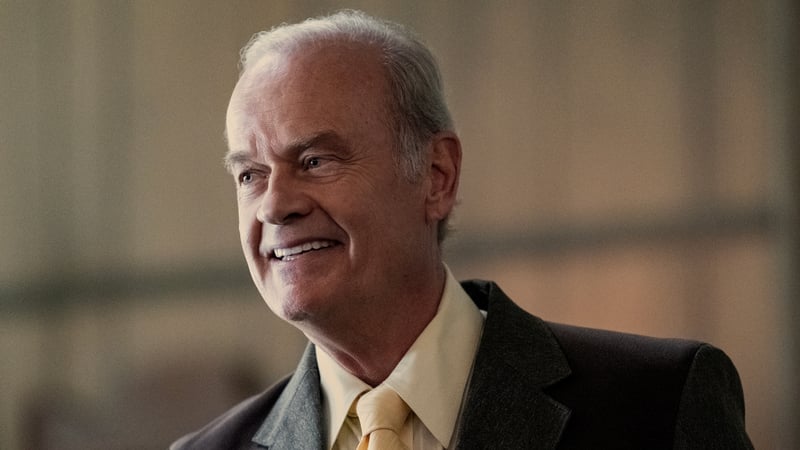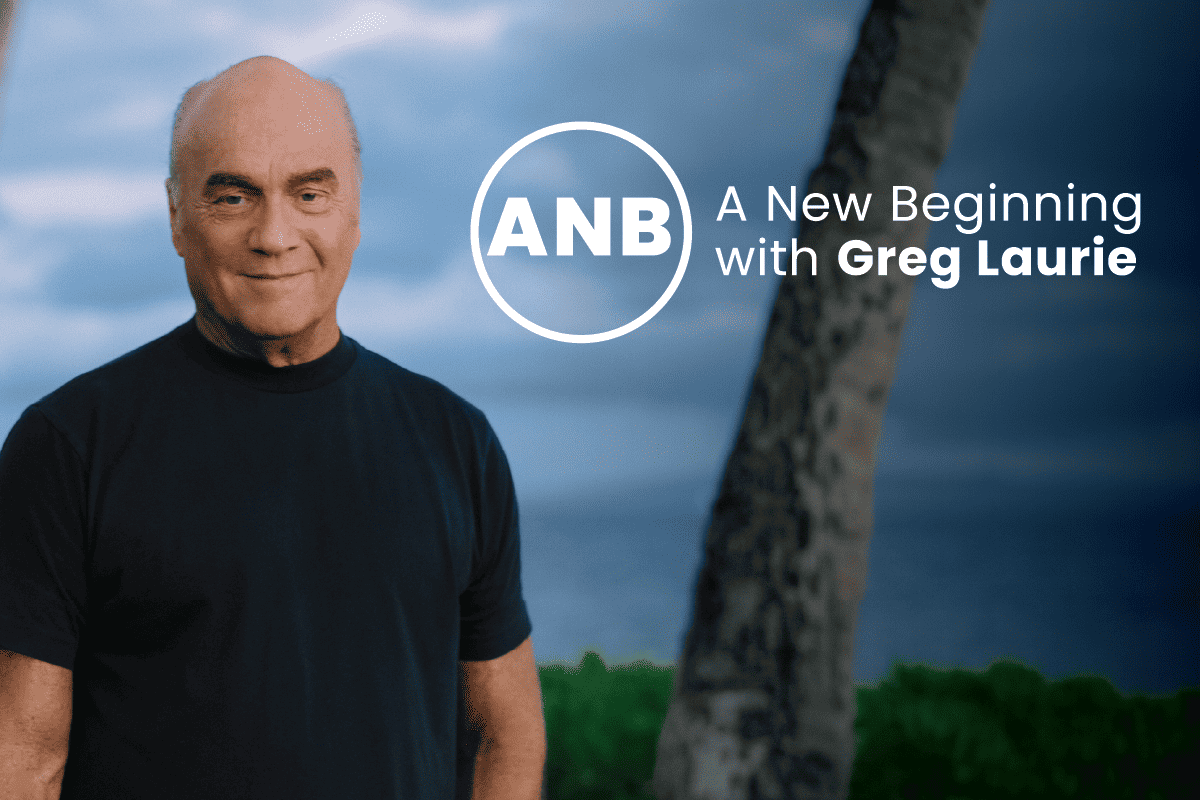There are many stellar performances in the new film Jesus Revolution, but the one that surprised me the most was Kelsey Grammer’s, who portrays Pastor Chuck Smith. I don’t think it’s hyperbole or exaggeration to say that this is his best film performance to date.
Kelsey Grammer as Pastor Chuck Smith
I knew Kelsey was an excellent actor (he is an Emmy, Tony, People’s Choice, and Screen Actors Guild winner, after all), but I was astonished when he agreed to be in our picture—a faith-based film—which is a first for him. I must tell you, having a front row seat to watch him work was one of the biggest thrills of my life.
Full disclosure: I have been on television and film sets before and have watched actors ply their trade in front of a camera and crew. But seeing Kelsey transform into a man who was a personal mentor and father-figure to me, and do him justice, was a once-in-a-lifetime experience that I watched intently and savored.
Here’s what I didn’t know about Kelsey Grammer: Though perhaps best known for his role of Dr. Frasier Crane, he is a trained Shakespearean actor. He attended The Juilliard School in New York City, which is widely regarded as one of the most elite drama, music, and dance performance schools in the world. His range of acting skills is mind-blowing, which came through in one scene in particular that I observed in person as it was filmed.
The scene was when Love Song played a piece of music (“Since I Opened Up the Door”) for Chuck Smith for the first time. While they played the song, the camera focused on Kelsey’s face, and tracked the progression of his expression from one of total rejection and resistance to openness and embracing. All of this was conveyed without his saying a single world. I was blown away.
“I can’t believe what you just did,” I told Kelsey after the scene was finished. “That was a master class in acting.” Kelsey, who is one of the friendliest people I know, was pleased and touched by what I had to say. And he knew I meant it.
What’s interesting about Kelsey’s process is that he wisely did not try to imitate Chuck Smith. Chuck had a certain cadence and tone to his voice, and was very distinct. Kelsey didn’t try to mimic that but delivered it in his own way but really caught the essence of who Chuck Smith was.
I asked Kelsey why he took the role of a struggling pastor who got swept away in the wave of the Jesus Movement. It was a legitimate question. After all, he has had a very successful and lasting career in Hollywood, which is as strong as ever. Kelsey told me he was at a stage in his life where he wanted to do something meaningful, something that could touch people’s lives. He even prayed about it. The next day, the script for Jesus Revolution showed up, and he agreed to do it. It was an answered prayer, and we are grateful Kelsey took this role.
I have no doubt his performance will have people asking, “Who was the real Chuck Smith?”
About Chuck Smith
Well, to be totally honest, Chuck Smith was the epitome of “uncool” in the 1960s—balding, married, middle-aged, preacher, father to four kids. True, he was a man’s man who followed pro football and baseball, and he was a person of integrity who taught his children respect for authority and God, and believed in the importance of an honest, hard day’s work and gratitude to God. But there was nothing about his life that would telegraph the coming unlikely partnership.
Chuck was highly competitive and hardly had any personal down time. For relaxation, he liked to do construction work. Growing up in the shadow of the Great Depression and World War II where individuals “pulled themselves up by the bootstraps” to find success, he worked hard and didn’t complain. He was a no-nonsense guy who set certain standards for his household and those who lived in it.
“Pastor Chuck” worked extremely hard all his life. His faith and the fate of his fellow men were serious business. So, when a bunch of rebellious and unkempt hippies showed up on his church doorstep seeking the message he was preaching, it tested the bounds of his compassion.
Let’s backtrack a little just to give you some perspective how this scenario all unfolded.
Chuck, Church, and Hippies
In December 1965, Chuck was hired to take over a congregation whose membership had dwindled to approximately twenty-five people. He had wanted a change from previous pastorate at the Corona Christian Church in Corona, California, to free himself from elders who had shackled him. But his new gig as the pastor of Calvary Chapel in Costa Mesa was not exactly what he had in mind. The $135 a week salary was a step in the wrong direction. However, the advantages, like greater autonomy in how he ran things and access to the beach (Chuck was an avid surfer), seemed like a good trade.
The church started as a Bible study that eventually expanded into a free-standing brick-and-mortar building. The congregation saw moderate growth under Smith’s steady leadership and conversational sermons. He felt an instant rapport with the congregation, who were mostly middle-class and conservative . . . and joyful.
But he didn’t get hippies—at all. He couldn’t fathom why they were so unhappy with their lives or comprehend the unconventional lifestyle they chose. As far as Chuck was concerned, these long-hairs needed to get a bath, a job, and a life. Oh, and a haircut, too. He rejected the idea of the disenfranchised hippie counterculture that had emerged in the late 1960s, especially their rebellion against anything or anyone that smacked of the status quo.
Chuck wrote in his 2009 biography, A Memoir of Grace, that “We had paid a price for the privileges we enjoyed—our homes, our cars, and household appliances. . . . Many remembered the hardships of the Great Depression that put our very survival at stake. But here were these kids, flaunting their rejection of the very things we worked hard to earn. Their behavior was unbelievable. Outrageous.”
While his wife Kay agreed in theory, she was fascinated with these slightly dazed “flower children.” Kay was a curious and compassionate woman—truly a people person. She had a heart for connecting with others.
One day while driving, she stopped at an intersection in Orange County and took notice of a pretty young girl on the sidewalk who was waiting for the streetlight to change. It was obvious to Kay this young woman was high on drugs. She was so high, in fact, that she had no idea where she was or what she was doing. Kay watched anxiously as the girl attempted to cross the street. Her heart went out to this young woman, knowing she must have parents somewhere who were worried about her.
Kay told her husband shortly after her experience that these kids were desperately in need of Jesus, and they had to know a different way of life, and it was their responsibility as Christians to find a way to reach them. With that perspective, Chuck chose to get on board. Besides, baptism might be the best way to see that these odd-looking ruffians finally got a decent bath.
Kay Smith’s Interest in Hippie Life
Kay dragged Chuck out to drive to nearby beaches in Orange County, which was considered the weed and LSD mecca at the time. The Haight-Ashbury “Summer of Love” scene had quickly turned into a nightmare as the utopia they had all wished for was being transformed into a dystopian society.
Those who fled the scene turned up on the shores of Southern California, where Chuck and Kay Smith found them during their weekend drives. While Chuck just shook his head in contempt, Kay wept as she saw hundreds of lost souls and disillusioned young people in need of a clearer and more life-affirming direction.
There was also a group of young hippies that would walk by Kay and Chuck’s house daily.
She felt burdened to pray that God would touch them and that they would come to Christ.
Years later, I told Kay that we used to walk past her house as nonbelievers, and she told me of her fervent prayers. They were heard by God.
The ones Kay didn’t see took shelter in pup tents, cardboard boxes, or smoke-filled VW vans. They spent their days and nights wasting away their youth. She was determined to understand what was inside their hearts and declared to Chuck while cruising Main Street in Huntington Beach: “We have to meet a hippie!”
The Smiths Meet Lonnie Frisbee
God granted that wish fairly quickly when their daughter Janette started dating a young man named John Higgins when she attended Southern California Christian College (now Vanguard University). Higgins had a taste of the Haight-Ashbury scene in San Francisco but quickly realized it was a vapid social experiment. Contrary to the promises, he didn’t witness much peace and love. Instead, he saw violence and depravity, so Higgins returned to college for his education and began turning to God for his answers.
John often shared the Good News of salvation with those he encountered, especially hitchhikers and other transients. One of those hitchhikers was a twenty-year-old man with long brown hair, a bushy mustache, and a beard. He bore more than a passing resemblance to the image we have of Jesus. His name was Lonnie Frisbee.
At some point in 1967, Lonnie received a vision from the Lord revealing that he was going to use him as “a light to thousands of other people.” He was absolutely fervent in his witness to others and became involved in a ministry called “The Living Room.” This group, situated in the middle of the Haight-Ashbury district, delivered hot gospel to the counterculture youth of the City by the Bay, including a straggler named Charles Manson, who had just been released from a seven-year stretch in prison. Lonnie spent that year drifting between San Francisco and Orange County, hitchhiking and sharing his testimony of what Christ had done for him.
When John was asked to deliver a hippie to the Smiths for enlightenment, he went big. He showed up on their doorstep in 1968 with Lonnie who was sporting a white, flowing linen shirt, bell-bottom jeans that had tinkling bells sewn in the hem of the cuffs, and a confident smile on his sun-kissed face. Higgins rang the bell, and the Smiths stood together as they opened the door.
Even though it looked like the beginning of an intergenerational war, it was a truly historical moment. As I wrote in my 2018 book, Jesus Revolution: “It was like when John Lennon met Paul McCartney or Steve Jobs met Steve Wozniak. Or when nitro met glycerin. Lonnie Frisbee and Chuck Smith were the same ontological species; aside from that, they had nothing in common in terms of personality, life experience, background, or appearance. But they both knew Jesus, and when Lonnie crossed Chuck and Kay’s threshold, something big and volatile was about to happen that only God could orchestrate.”
Lonnie’s Impact Is Felt
Lonnie’s influence was soon felt at the church as droves of “Jesus Freaks” flooded into Calvary Chapel and set up camp. These ragged and unconventional hippies packed in for Chuck’s Wednesday night services, much to the chagrin of his older, conservative congregation. This invasion was initially a source of great consternation for his parishioners, who had become accustomed to a particular way of worshiping. But Chuck Smith felt that he could not turn them away.
“Their hearts were so filled with the love of Jesus Christ, and everybody just immediately fell in love with them, and it really wasn’t a hard thing to accept them,” Chuck recalled to journalist Dan Wooding. “We had been teaching the people First John and that the real proof of the Christian life is loving. So, the people did love them and embrace them, and so it was an exciting experience.”
That experience was the beginning of the movement, and era historians have deemed “The Jesus Revolution.” While the culture was calling for a social revolution, God intervened and sent a revolution of a different sort. This coming-of-age generation was seeking enlightenment and change, but they didn’t yet understand that what God was doing in and through them was ushering in what would be the last great, and perhaps most significant, spiritual awakening in America.
Through God’s gentle but firm prompting, Chuck Smith opened himself up to his true calling. He had to embrace something he didn’t understand, and he had to embrace a group of people he wasn’t sure he could love. But his willingness resulted in bringing thousands of unlikely believers into the fold.
In my opinion, there would not have been this “spiritual explosion” had Chuck Smith and Lonnie Frisbee not joined forces, even if it was only for a short time. Lonnie was the magnetic, charismatic figure that drew the kids in. Chuck was the kindly father figure that stabilized us. We came for Lonnie, but we stayed for Chuck.
And now we are all saved by the blood of Jesus.

Did you pray with Pastor Greg?
To help you get started, we would love to send you a free Bible and other resources to help you grow in your faith.
Get Resources




